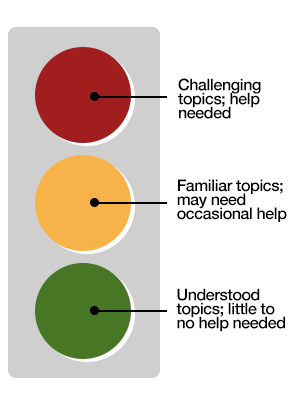As we hear news that school closures will be extended, many parents or guardians may be beginning to worry about how their children will do when trying to learn on their own from home. Here are some tips on how parents or guardians can help their children remain engaged in learning.
For elementary school-aged children:
Create a daily habit of doing some academic work by using habit stacking. For example, after they brush their teeth, get dressed and make their bed, it’s time to do some school work. Use the stoplight system to determine which topics need to be
studied further, and which topics your child is confident in!
- Schedule time to work on more challenging subjects earlier in the day when motivation and willpower are higher (as they can be depleted as the day goes on). Use the stoplight system to prioritize and schedule academic work based on your child’s knowledge level:
- Red = more challenging work that they may need help with
- Yellow = they are able to do the work with occasional guidance and clarification
- Green = they are able to work independently with little to no support

- Choose a designated learning space. Help your child to choose and set up a space where they will be able to work distraction free (away from TV, siblings). Help them set up a space that encourages them to enjoy their studying, like decorating a name tag or providing colourful school supplies.
- Use rewards and incentives for earning screen time. For example, for each unit of work completed, your child earns 10 minutes of screen time for later that evening.
For high school-aged children:
- I recommend similar tips for older students in terms of study space and making a plan or scheduling time to do school work; however, the difference is that teens can have a little more autonomy and flexibility. Allow them to choose the order of activities in their schedule as long as they have completed some academic time, and some active time on a daily basis.
- Be clear on screen time boundaries. Monitor and limit usage of non-educational apps. Create a cell phone parking lot in your home (far away from their study space) where the phones have to stay during academic time.
- While we are waiting on updates from the school boards, students can work on homework/projects that were previously assigned before the closures.
- Many students will be missing their friends and the social interaction. Having virtual study groups using apps such as House Party can allow students to focus on academics while engaging with their peers.
- It’s a great time to learn/practice a new life skill such as cooking, cleaning, knitting, building, etc. Maybe the family can choose a night of the week where your child makes dinner for everyone!
Stay healthy and Happy Studying!
By Joanne Dominico
https://studywithjoanne.com/